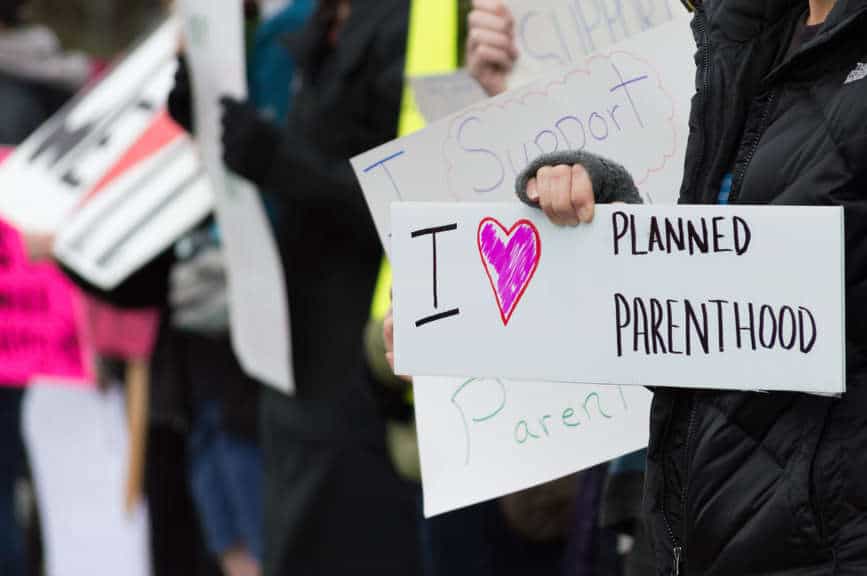Planned Parenthood Mythbusters: Everything You Need to Know

Unless you’ve lived as a media recluse for the last year or so, you’ve probably heard about moves to stop Planned Parenthood. Although 45 has been occupied with a range of other issues, our new president still found the time to pen an executive order aimed at stripping away federal funding from the clinics. As someone who loves birth control as much as she loves using it, that struck a nerve. What would happen to millions of people like me–people who need contraceptives, people who have needed a pregnancy test in a pinch–if they couldn’t access the services they relied on?
To learn more about the impact of Planned Parenthood, I talked to Christina Mullinax, Arkansas organizer of Planned Parenthood Great Plains.
As a state organizer of Planned Parenthood Great Plains, what do you do?
I organize people to take actions (showing up for rallies, trainings, forums and lobbying events; making phone calls; sending emails and letters to their elected officials) that will change public perceptions and impact policies for the good of our communities and the people we serve.
One of the central pieces of anti-Planned Parenthood rhetoric is its funding—opponents say that they don’t want tax dollars to go abortions. How are Planned Parenthood clinics really funded, and what does the money really go to?
Planned Parenthood’s national office and affiliates receive funding from a wide variety of sources. These include foundations and individual supporters, as well as reimbursements for providing preventive health care services like cancer screenings and birth control to low-income patients — just like the reimbursements other health care providers receive.
All government grants that Planned Parenthood receives are restricted for specific purposes. Planned Parenthood complies with these and all other government restrictions. Other government funds are reimbursements for medical services provided. We receive these reimbursements just like hospitals and other medical providers do. Federal law already prohibits the use of federal funds to pay for abortions except in extremely rare and difficult circumstances.
What services does Planned Parenthood provide?
Planned Parenthood health centers provide a wide range of preventive health care services, including lifesaving cervical and breast cancer screenings, birth control, pregnancy testing, emergency contraception, STI testing and treatment, and abortion. We ensure that women have accurate information about all of their options.
From October 1, 2013 through September 30, 2014, Planned Parenthood health centers saw 2.5 million patients, who collectively received 9.5 million services. A service is a discrete clinical interaction, such as the administration of a physical exam or STD test or the provision of a birth control method.
Here is the current breakdown of services:
- STI/STD Testing and Treatment: 45%
- Contraception: 31%
- Cancer Screening and Prevention: 7%
- Other Women’s Health Services: 13%
- Abortion Services: 3%
- Other Services: 1%
Opponents of Planned Parenthood say that its patients just can go elsewhere for those services. Is that true?
The American Public Health Association called that idea “ludicrous.” More than two-thirds of states have reported difficulty ensuring provider participation with Medicaid programs, and approximately half of the states report challenges ensuring speciality providers — including OB/GYNs — for Medicaid programs.
What obstacles would patients face in seeking care elsewhere?
Where to begin? From “The Cost of Defunding Planned Parenthood:”
During the Senate debate [in 2016], the California Primary Care Association wrote that defunding Planned Parenthood would place “untenable stress” on their facilities.
In 2011, Indiana attempted to defund Planned Parenthood and has since so dramatically slashed funding that five clinics, all of which offered HIV testing, were forced to close. In March of this year, Governor Mike Pence declared a state of emergency in the state of Indiana, as the result of an unprecedented outbreak of HIV. The outbreak’s epicenter was Scott County, once home to one of the five closed Planned Parenthood health centers.
Planned Parenthood had served Shelby County, Tennessee’s Title X clients for 30 years, but in 2011 the county decided to give the contract to Christ Community Health Services, a religious organization that will not provide abortions or contraception, and will not refer patients to any provider who will offer abortions. In the months following this change, Shelby County saw a more than 90% decrease in the monthly number of patients served — from approximately 719 per month seen at Planned Parenthood to 51 per month at Christ Community. And nobody at CCHS can account for the loss.
Texas slashed the family planning budget by two-thirds in 2011, and 53 clinics were forced to close. The Planned Parenthood health centers that were forced out of the Women’s Health Program served nearly half of the program’s clients. According to researchers at George Washington University, Texas’ remaining facilities would be forced to increase their caseloads by 2-5 times to fill that gap. As a result of Texas’ efforts to defund Planned Parenthood, 54% fewer patients received care and experts were anticipating nearly 24,000 unplanned births between 2014-2015 alone, raising state and federal taxpayers Medicaid costs by $273 million.
And those are just a few examples.
What other roles does a Planned Parenthood clinic play in a community?
Planned Parenthood is the nation’s leading provider of high-quality, affordable healthcare for women, men, and young people, and the nation’s largest provider of sex education. With 661 health centers across the country, Planned Parenthood serves all patients with care and compassion, with respect and without judgment.
Through Planned Parenthood health centers, programs in schools and communities, and online resources, we are a trusted source of reliable health information that allows people to make informed health decisions. Backed by 8.5 million supporters, Planned Parenthood fights to ensure that all women can get the health care services they need. We do all this because we care passionately about helping people lead healthier lives.
How would the defunding of PP impact our region, specifically?
Sadly, it is in areas of highest need like the South where people would be hit the hardest. Reducing or eliminating public funding for preventive health care at a time of economic need is bad public policy. Cutting off health care to patients who rely on Medicaid and other public health programs would lead to more unintended pregnancy, more untreated STIs, and more undetected cancers. As a result, it would also increase healthcare costs.
Editor’s Note: It’s also very much worth noting that defunding Planned Parenthood actually increased abortion rates in Texas.
Why do you personally stand with Planned Parenthood?
When I first moved to Little Rock in 2000, I had aged out of my parent’s health insurance coverage and had no coverage of my own. I was in need of low-cost birth control so I went to the clinic at UALR and was referred to Planned Parenthood at that time. I made the appointment, they signed me up for Medicaid that day and I went home with a prescription for birth control.
I felt deeply grateful for the high-quality, nonjudgmental and compassionate care I received there. In 2004, I began volunteering with Planned Parenthood and joined the local board in 2010. In 2012, I began working full-time as Regional Organizer and feel very grateful to have a career I am truly passionate about. I love hearing others’ stories of why they are also passionate about supporting Planned Parenthood.
How can we support Planned Parenthood?
In addition to volunteering with me, or your state organizer if you’re not in Arkansas, you can support Planned Parenthood by:
- Text “STAND” to 22422 to join our Planned Parenthood Mobile Action Network. You can text STOP to quit anytime. (Data and standard message rates apply.)
- Use Planned Parenthood for your reproductive health needs! https://www.plannedparenthood.
org/health-center/AR or call 800-230-PLAN - Submit a letter to the editor expressing your support for Planned Parenthood. Arkansans can submit to the Democrat Gazette. (Tips for writing a letter are here.)
- Check that your voter registration is up to date
- Register to vote or update your registration
- Follow PP Great Plains Arkansas on Twitter
- Donate at www.ppgreatplains.org
- Purchase gear to show your support
Last modified on March 6th, 2018










Show Comments +